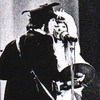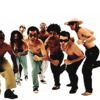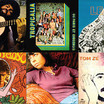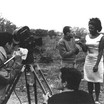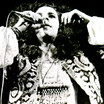Ilumencarnados seres
julio medaglia
Interviews
Ana de Oliveira – How did you and your partners, musicians connected to the European avant-garde, become interested in the Brazilian popular music?
Júlio Medaglia – Hans Joachim Koellreutter influenced us a lot, he forced our generation to have broader cultural relations. Obviously popular music interested us, as well as theater, expressionist cinema, everything from that time – and from other times too, including music before Bach. But, from João Gilberto on, we felt that the popular music had become more present in the Brazilian thought. Mainly in the 60’s.
Ana de Oliveira – Besides the “Tropicália” arrangement, did you produce more works within the Tropicalista frame?
Júlio Medaglia – Tropicalismo’s experience had already occurred years before within the erudite music field. When I composed the soundtrack for the play Galileu Galilei, by Brecht, directed by Zé Celso, I inserted sambinhas and marchas-rancho into it.
Ana de Oliveira – Could you provide a panorama of the post-war musical culture?
Júlio Medaglia – In the 60’s, the European festivals were a magnet for the avant-garde culture. In Germany, all radio stations and orchestras started to play contemporary music. John Cage, the North-American avant-garde leader, was one of the most audacious revolutionaries of that time. After the Second World War, the dodecaphonism and the serial music returned to the scene. Schönberg had a few days of glory. In the late 50’s, music was following a millimetric constructivism, which corresponded, for instance, to the cool jazz sophistication and the popular chamber music of João Gilberto. Then, we tried eliminating the random aspect and working with the smallest number of elements. It was what Concretism was making in poetry and painting: total bareness with no redundancy. It reached a point that such constructivist leaders wanted to blow out their principles in order to inaugurate new experiences.
Ana de Oliveira – So, Caetano and Gil corresponded to that time’s tendency of mixing components, questioning codes, blowing up systems.
Júlio Medaglia – In the Brazilian popular music, they corresponded to the North-American and European’s happening music.
Ana de Oliveira – How did rock boom?
Júlio Medaglia – Rock began as a very squared music, two and a half minutes of chords perfectly fit to dance, but soon it exploded and became a much wider proposition. In Brazil, Tropicalismo also represented this opening, with music freeing itself from all its bonds to encompass many cultural components, not only musical ones.
Ana de Oliveira – How did you see the rock made by the Mutantes?
Júlio Medaglia – They didn’t make rock, but a parody of rock. With the Mutantes, rock happens in an aggressive way. In an article I wrote to Veja magazine, in 1969, on the Mutantes’ third album, I punched the Beatles: “you are still coming up with these boring violins…” Fortunately, Sargent Pepper’s came afterwards.
Ana de Oliveira – Was Brazil, in the 60’s, too conservative to understand Tropicália?
Júlio Medaglia – Any country is conservative. I don’t know any revolutionary who found the way clear. Igor Stravinsky, who lived in Paris, the cultural capital of the early twentieth century, composed “Rite of Spring,” so important as Dante’s Divine Comedy. In the debut, people threw chairs onto the stage. The orchestra’s musicians themselves were making jokes and had to escape by the back doors of the theatre. Beethoven, Satie, João Gilberto, the innovators have never been welcomed.
Ana de Oliveira – In your opinion, what seems to have been the aesthetic-critical-revolutionary substrate of Tropicália?
Júlio Medaglia –Tropicalismo placed the erudite side by side with the popular, the highest value at the same level of the worthless, because the Brazilian character is identified by a thousand values. It brought to the present things which were considered as belonging to the past, like Cartola or Elizete Cardoso. It demystified concepts of quality, showing that not only João Gilberto but also Vicente Celestino form Brazil. We erudites didn’t approach the Brazilian popular music to please people, but to nurture ourselves. After Tropicália, music had to be something gigantic, because it could apprehend everything, from the Berlin Philharmonic to any illiterate playing berimbau, from Miles Davis to Vicente Celestino.






